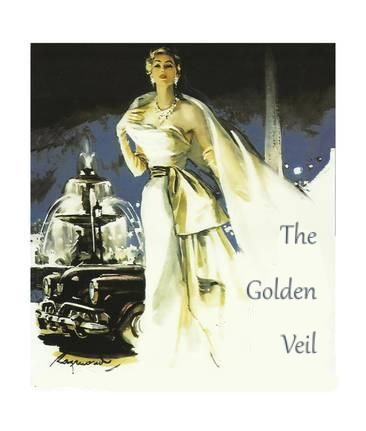
Dame Celia Constance Tyrrel, OKG (Order of the Knights Genesta), 1902 - 1995

This setting is based on the fiction of the Inklings, mainly Lewis and Tolkien. But this setting is also supposed to be our own world plus the Sundered world. How does that work? Superman comics take place in a world where no one reads Superman comics; Harry Potter lives in a world where no one has read the Harry Potter books.
Well, fiction can live in the real world. Sherlock Holmes lived in a setting that included Watson's stories about him, published in The Strand; Holmes sometimes chided Watson about over-dramatizing. L. Frank Baum solemnly explained that, after Dorothy moved to Oz, she sent him the details of the later stories by radio telegraph. Lewis claimed to know Ransom; Tolkien claimed to be translating The Red Book of Westmarch.
But how to get around the Sundering itself? The events of Lewis's Space Trilogy must be heavily Sundered, so why are the books available all over the world?
Because they are presented as fiction. The Sundering is the luck that hides magic. The idea of magic as fiction competes with the idea of magic as reality, or as conspiracy theory. Write up Sundered events as fiction and, if you can get over the ordinary hurdles of getting published, the Sundering is a wind at your back.
After all, you don't believe me, do you? Of course not.
"C. T. Constantine" and "John Edgar Davids" were the pen-names of two pulp-era authors who appeared to be English but were, in fact, subjects of the cryptic nation of Grand Normandy. Both used fictionalization, somewhat subtly, to help keep their nation safely Sundered.

A Grand Norman who, under her cover identity of "C. T. Constantine," became known in the unSundered world as the author of mystery-romance novels and pulp magazine stories, often with a supernatural tinge. Her works fit comfortably into their genres, and were popular in their time (though now forgotten—you never heard of her, did you?), and made her a nice living.
Main works:
The "Golden Veil" magazine series, about an aristocratic socialite who plays cat-burglar in the cause of right, doing things like steal back compromising letters and photos from blackmailers of young lovers, help poor honest smugglers run guns and money to refugees and freedom fighters, help escaping refugees, and help mystics and good clerics against evil cultists, all while painting the old aristocracy in glowing colors. She generally has a confrontation scene in which she hides her face behind a gold lamé veil or speaks through a golden curtain.
The "Chateau Jeudi" series of novels, about the sparklingly sophisticated and cosmopolitan Vicomte and Vicomtesse Jeudi, he idealistic and romantic, she more practical. They exhibit a soft spot for young people caught in webs of blackmail, unhappy arranged marriages, and love-triangles or love-dodecahedrons. These young lovers tend to be smugglers, refugees from oppressive regimes, or of violently clashing backgrounds. They and their persecutors wind up at sumptuous and elaborate parties at Chateau Jeudi, somewhere in the French countryside. The parties often feature masquerades or strange games, and any persecutors come to grief.
The "Tiger Lilleys" adventures, children's stories starring Devarati ("Devi") and Parvati ("Parvy") Lilley, India-born English girls and juvenile ghost-busters, working at their English boarding school, which is apparently infested with occult incursions, initially Indian but later from all over. They have no powers, except for a "spider-sense"-like ability to recognize magic when they see it, but they are daring and knowledgeable. They also have Indian sidekicks who would never pass muster today, though these get some good lines. When they need an adult, there is Mr. Planter, the history and geography teacher, an "old India hand" like them; sometimes he needs to be evaded; sometimes he needs to be rescued.
 Sir Edgar Johns FitzDavid, OKG (Order of the Knights Genesta), 1889 - 1982
Sir Edgar Johns FitzDavid, OKG (Order of the Knights Genesta), 1889 - 1982A Grand Norman who, under his cover identity of "John Edgar Davids" ("JED" to his fans) became known in the unSundered world as a worthy and popular imitator of pulp SF and fantasy stars. His works are clearly derivative and second-string, but were popular in their time (though now forgotten), and made him a nice living.
Main works:
The "Torrance" series of planetary adventures, a thinly veiled derivative of A Voyage to Arcturus by David Lindsay: the hero, Mark Davids (fictitious nephew of the author) goes in search of his missing inventor uncle (other side of the family), finds his derelict "star capsule" and is transported to Torrance, planet of the red giant variable star Mira, inhabited by assorted polychromatic humanoids, each race with a different additional organ that you can acquire by initiation into the tribe. By the second volume, Mark finds his uncle, who has gone ultra-native with a full set of extra organs (extra arms, prehensile tail, third eye, horns, etc.). Mark stays to marry a Torrancine girl and have adventures ever after, with his uncle as wise if eccentric sidekick.
The "Professor Storm" series, featuring the middle-aged but herculean Prof. Thorvald Storm, who seems to be a combination of archeologist, occult investigator, and vigilante do-gooder, backed by a colorful set of sidekicks and a world-wide collection of old friends and contacts, who often seem magical if not downright mythical. He and his plucky niece Freida take turns rescuing each other to an accompaniment of witty banter.
The "Mirror Man" comics, featuring Sir Faramond the Mirror Man, of course (drawn first by Belvidere "Bully" Day and then by Matthieu Victor), a knight from an Arthurian-fantasy world who can be summoned through a mirror by any of a stable of sidekicks who have somehow acquired the favor of his enchantress-queen. Once on our side of the mirror, he is an action hero with a penchant for swords, flowery speech, and plot-motivating principles of chivalry. He has no overt superpowers, but sometimes fairytale creatures come with him and he is very knowledgable about occult menaces.
———
Dame Celia and Sir Edgar were knighted for their services to the Crown in preservation of the national Sundering by misdirection and muddying the waters. Their tales did not resemble any specific doings of Grand Normandy, but they were given a Grand Norman coloring, down to props such as enchanted wines, guns, and cars. This was regarded by the unSundered as good stylistic color and setting development, but it also meant that reports of such things would be dismissed as garblings or imitations of the fictions, as would stories of murky events involving aristocrats, occultists, and smugglers. "Right. Next you'll tell me you met the Golden Veil herself." "Sounds like a Professor Storm adventure." With the Sundering providing that wind at their back, these distractions worked well, at least in the opinion of the Crown.
Return to Inkliverse
Return to Wind Off the Hilltop
Copyright © Earl Wajenberg, 2019